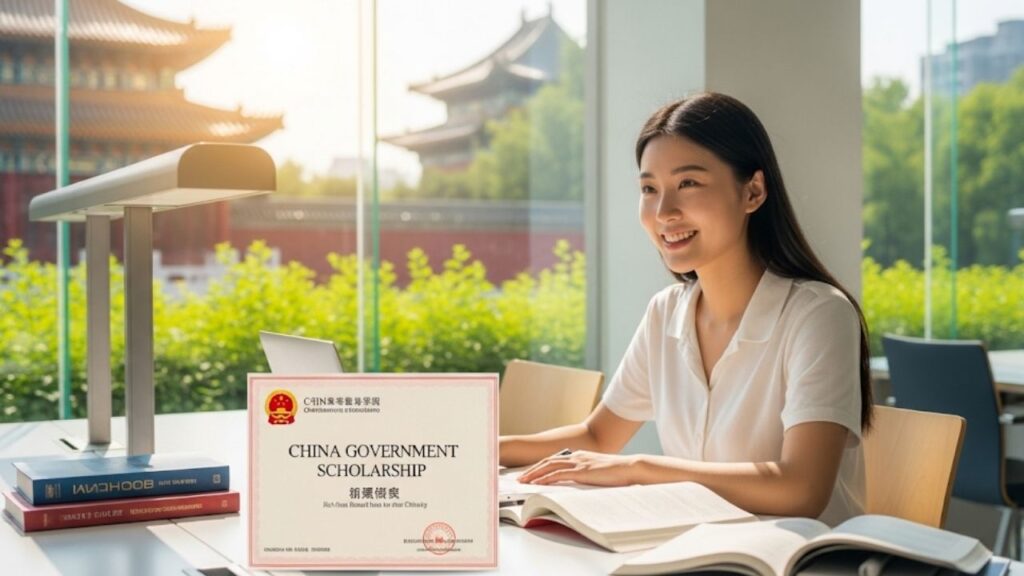Embarking on the journey to secure a China Government Scholarship for the 2026 session can feel like navigating a vast and exciting landscape. One of the most crucial, yet often underestimated, elements of your application package is the recommendation letter. These letters aren’t just formalities; they are powerful endorsements that can significantly sway the admissions committee in your favor. As someone who has advised countless students through this intricate process, I’ve seen firsthand how a well-crafted recommendation can illuminate an applicant’s true potential.

The Undeniable Power of a Strong Recommendation Letter
A China Government Scholarship application is more than just academic transcripts and a dazzling personal statement. It’s about presenting a holistic picture of who you are, your capabilities, and your aspirations. Think of recommendation letters as independent testimonials, vouching for your character, academic prowess, and suitability for studying in China. They provide an external, objective perspective on your strengths, filling in the gaps that your own words might miss. In my experience advising students, one common hurdle is understanding that these letters go beyond a simple “he’s a good student.” They need to be strategic, detailed, and compelling.

Finding the Right Advocates: Who to Ask?
Choosing who will write your recommendation letters is a critical first step. The quality of your recommender directly impacts the weight of their letter. For the China Government Scholarship, aim for academic professionals who know you well and can speak to your academic achievements and potential.
Academic Recommenders
Ideally, these should be professors or lecturers who have taught you in relevant subjects, supervised your research, or overseen your projects. They can attest to your:
- Academic performance: Your grades, understanding of complex concepts, and participation in class.
- Research potential: Your ability to conduct independent research, analyze data, and contribute to your field.
- Work ethic and intellectual curiosity: Your dedication, persistence, and genuine interest in learning.
Professional Recommenders (If Applicable)
If you have significant work experience or have been involved in relevant internships, a supervisor or mentor from that setting can also provide a valuable perspective. They can highlight your:
- Professional skills: Teamwork, leadership, problem-solving, and communication.
- Initiative and responsibility: Your ability to take on tasks, meet deadlines, and contribute to a professional environment.
- Specific achievements: Concrete examples of how you made a difference in their organization.
Crafting the Perfect Request: Guiding Your Recommenders
Once you’ve identified your recommenders, the way you approach them can significantly influence the quality and timeliness of their letters. Remember, professors and supervisors are busy people. Make it easy for them to write a strong letter for you.
When to Ask
Give your recommenders ample time – at least 4-6 weeks before the deadline. This allows them to thoughtfully consider your request, gather their thoughts, and write a high-quality letter without feeling rushed. Approaching them too close to the deadline often results in generic or hastily written letters.
What to Provide
Equip your recommenders with everything they need to write a compelling letter. This includes:
- Your CV/Resume: A concise overview of your academic and professional achievements.
- Your Statement of Purpose/Motivation Letter: This helps them understand your goals, why you want to study in China, and how this scholarship aligns with your aspirations.
- Your Academic Transcripts: To remind them of your academic performance.
- The specific scholarship details: Provide the full name of the China Government Scholarship, the program you’re applying for, and the university if you have a preference. Include a link to the official scholarship website for their reference.
- Key qualities you’d like them to highlight: Gently suggest 2-3 specific traits or experiences you want them to emphasize, backed by concrete examples. For instance, “Could you please highlight my leadership skills demonstrated during the research project on [Project Name]?”
- The submission method and deadline: Clearly state how and when they need to submit the letter (e.g., online portal, email, sealed envelope).
- A pre-addressed, stamped envelope: If the letter needs to be mailed.
- A polite follow-up reminder: A week or so before the deadline is appropriate.
Essential Elements of a Powerful Recommendation Letter
While you won’t be writing the letter yourself, understanding its core components will help you guide your recommenders effectively. A strong recommendation letter for the China Government Scholarship will typically include:
- Introduction: Clearly states the recommender’s relationship to you (e.g., “I have known [Applicant Name] for [X years] in my capacity as their [Professor/Supervisor] at [University/Organization]”).
- Context of Interaction: Briefly describe the courses they taught you, projects you worked on together, or your role in their team. This establishes credibility.
- Specific Examples of Strengths: This is where the letter shines. Instead of vague statements, the recommender should provide concrete anecdotes and examples that illustrate your skills and qualities. For instance, “During the ‘Advanced Thermodynamics’ course, [Applicant Name] consistently demonstrated an exceptional grasp of complex concepts, particularly evidenced in their final project where they successfully modeled…”
- Key Qualities Highlighted: Focus on qualities relevant to a scholarship in China, such as:
- Academic excellence and intellectual curiosity
- Research potential and analytical skills
- Diligence, perseverance, and problem-solving abilities
- Interpersonal skills, teamwork, and leadership (if applicable)
- Adaptability and openness to new cultures (highly relevant for studying abroad)
- Comparison (Optional but impactful): If appropriate, the recommender can compare you to other students they have taught, perhaps stating you are “among the top X% of students I have taught in the past five years.”
- Enthusiastic Endorsement: A strong, unequivocal recommendation for the scholarship.
- Contact Information: The recommender’s professional contact details for verification.
Sample Phrases and Templates for Inspiration
While every letter should be unique, providing your recommender with some direction or even a sample structure can be helpful. Remember, these are just starting points, and the recommender should use their own words and genuine observations.
Opening Example
“It is with immense pleasure that I recommend [Applicant Name] for the China Government Scholarship for the 2026 session. I have had the privilege of teaching [Applicant Name] in my [Course Name] class during the [Academic Year] at [University Name], where they consistently demonstrated exceptional academic prowess and a keen intellectual curiosity.”
Highlighting Academic Prowess
“[Applicant Name]’s analytical skills were particularly evident in their research paper on [Topic], which showcased their ability to synthesize complex information and present well-reasoned arguments. They consistently performed at the top of their class, often going above and beyond the course requirements.”
Emphasizing Cultural Adaptability
“Beyond their academic strengths, [Applicant Name] possesses a remarkable open-mindedness and enthusiasm for diverse cultures. I am confident they will thrive in the vibrant academic and social environment of China, contributing positively to the international student community.”
Important Considerations and Common Pitfalls
Confidentiality is Key
Ensure your recommenders submit their letters directly to the scholarship committee or university. Most scholarship portals have a system where an email link is sent to the recommender for direct submission, maintaining confidentiality and integrity. Never handle the recommendation letters yourself.
Language of the Letter
The China Government Scholarship generally accepts letters in English or Chinese. If your recommender is writing in another language, ensure it’s accompanied by a certified English translation. Always double-check the specific requirements on the official CSC website.
Follow-Up Gracefully
A polite email after the deadline, thanking your recommenders for their time and effort, is always appreciated. Let them know the outcome of your application when you receive it!
Navigating the Application Process for China Government Scholarships
The China Government Scholarship application can seem daunting, but breaking it down into manageable steps makes it much less intimidating. Remember to focus on presenting a well-rounded and compelling profile. The recommendation letters are a vital piece of this puzzle, offering external validation of your capabilities and potential.
Stay Connected with Official Channels
It’s always a good idea to follow official channels for updates and insights regarding the scholarship.
Securing an Acceptance Letter for the China Scholarship Council (CSC) in 2026
The Deakin University Research Training Scholarship Program 2026 Is Now Open!
FAQ
Q1: How many recommendation letters are typically required for the China Government Scholarship?
Most China Government Scholarship applications require two recommendation letters. However, always check the specific requirements for the program and university you are applying to, as this can vary.
Q2: Can my recommender be from a different academic field than my intended major in China?
Ideally, your recommenders should be from a field relevant to your intended major, or at least familiar with your academic capabilities. However, if you have a strong recommender from a different field who can speak to your general academic excellence, work ethic, and relevant transferable skills, that can also be acceptable. Focus on who knows you best and can write the most specific and positive letter.
Q3: What if my recommender wants to write the letter in Chinese, but the application is in English?
If your recommender prefers to write the letter in Chinese, you will need to provide a certified English translation. This means the translation must be done by a professional translator and officially stamped or sealed to verify its accuracy. Ensure you confirm with the scholarship committee if they have specific requirements for certified translations.










